2013年八年级英语上册_Unit_2_How_often_do_you_exercise_Section_B_3a-3c写作课件_(新版)人教新目标版
人教新目标八年级英语上册思维导图课堂笔记Unit2Howoftendoyouexercise

⼈教新⽬标⼋年级英语上册思维导图课堂笔记Unit2HowoftendoyouexerciseUnit 2 How often do you exercise?2013版⼈教新⽬标⼋年级英语上册思维导图课堂笔记1. housework n. 家务劳动;家务事We should help our mothers do the housework. 我们应该帮助妈妈做家务。
不可数名词do the housework做家务homework家庭作业homework家庭作业workhouse劳动救济所schoolwork课堂作业workplace⼯作场所workhorse吃苦耐劳的⼈workbook练习册2. hardly adv. ⼏乎不;⼏乎没有There’s hardly any tea left. 没有剩下什么茶。
表否定,改反意疑问句时,疑问部分⽤肯定形式This boy hardly eats junk food,does he?=almost nothardadv.努⼒地;艰难地adj.困难的3. ever adv. 在任何时候;从来;曾经Don’t you ever get tired? 难道你从来不累吗?hardly ever⼏乎从不ever since⾃从常⽤于疑问句和否定句中neveradv.从不,从来没有4. once adv. ⼀次,曾经The farmers here sow once a year. 这⾥的农民⼀年播种⼀次。
once a week⼀周⼀次意为“曾经”时,常与过去时连⽤。
位于⾏为动词之前、系动词之后。
He once lived in Hangzhou.This book was famous once,but now nobody reads it.5. twice adv. 两次,两倍I go shopping twice a week. 我⼀个星期购物两次。
Cats sleep twice as much as people. 猫睡觉的时间是⼈的两倍。
英语八年级上册Unit2how-often-do-you-exercis

Notes
本课时我们学习的主要语法点是由 what 和 how 引导的特殊疑问句以及对应的答语。 如: What do/does …?
How often do/does …? 等。 What do you usually do on weekends? 你通常周末做什么? I usually listen to music. 我通常听音乐。
Exercise three times a week
A: How often do you exercise? B: Three times a week.
HOW OFTEN DOES HE/SHE DO THESE ACTIVITIES?
.
watch TV
twice a week
A: How often d twice a week
How often every day once a week twice a week three times a week once a month twice a month
※:对频率副词提问,应该用哪个特殊疑问词呢?
every day
once a week twice a week
How often
twice a month, three times a month, three or four times a month 等。
• 典型例题解析
“How often do you exercise?” “I often exercise every day.” “你(你们)多久锻炼一次身体?”“我通常每天 都锻炼。”
………
ORAL PRACTICE
• How often do you do those activities? Make conversations with your partner.
部编版八年级英语上册Unit2Howoftendoyouexercise题型总结及解题方法
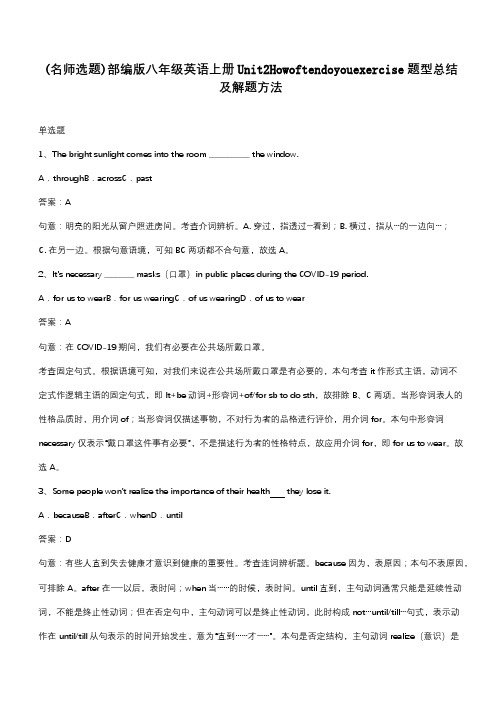
(名师选题)部编版八年级英语上册Unit2Howoftendoyouexercise题型总结及解题方法单选题1、The bright sunlight comes into the room ___________ the window.A.throughB.acrossC.past答案:A句意:明亮的阳光从窗户照进房间。
考查介词辨析。
A. 穿过,指透过…看到;B. 横过,指从…的一边向…;C. 在另一边。
根据句意语境,可知BC两项都不合句意,故选A。
2、It’s necessary ________ masks(口罩)in public places during the COVID-19 period.A.for us to wearB.for us wearingC.of us wearingD.of us to wear答案:A句意:在COVID-19期间,我们有必要在公共场所戴口罩。
考查固定句式。
根据语境可知,对我们来说在公共场所戴口罩是有必要的,本句考查it作形式主语,动词不定式作逻辑主语的固定句式,即It+be动词+形容词+of/for sb to do sth,故排除B、C两项。
当形容词表人的性格品质时,用介词of;当形容词仅描述事物,不对行为者的品格进行评价,用介词for。
本句中形容词necessary仅表示“戴口罩这件事有必要”,不是描述行为者的性格特点,故应用介词for,即for us to wear。
故选A。
3、Some people won’t realize the importance of their health they lose it. A.becauseB.afterC.whenD.until答案:D句意:有些人直到失去健康才意识到健康的重要性。
考查连词辨析题。
because因为,表原因;本句不表原因,可排除A。
after在……以后,表时间;when当……的时候,表时间。
2013 八年级上 Unit_2_How_often_do_you_exercise_Section_B

Healthy / unhealthy lifestyle?
Lisa sleeps eight hours every night. She eats a good breakfast and she exercises every day. She never eats junk food.
Healthy / unhealthy lifestyle?
4 SURVEY
Add five questions to the survey on page 81. Then ask three classmates the questions and take notes. Discuss and decide: Who is the healthiest student?
Pam likes watching TV. On weekends, she never exercises and she doesn’t like fruits or vegetables. She eats junk food. And Pam never goes to the doctor.
hardly ever
sometimes never nine
3. eat fruit
4. sleep 5. drink milk 6. eat junk food
7. drink coffee
never two or three three or four times a week times a week four times never a day
How are your eating habits?
activities Eat vegetables Eat fruit Drink milk Eat junk food Drink coffee Every Three or Once or day four times twice a a week week never
八年级上 Unit_2_How_often_do_you_exercise_self check

4、一些学生一周上一两次网。 Some students surf the Internet once or twice a week. 5、你每天晚上睡几个小时? How many hours do you sleep every night ? So maybe I’m kind of unhealthy , although I have a healthy habit . 7、吃水果对我们的健康有好处。 Eating fruit is good for our health . 8、我尽量每天都做运动。 I try to do exercise every day .
一、根据句意和首字母完成单词
1、He is very strong because he often e xercises . 2、Do you like s urfing Internet ? the 3、Here are the r esults of his survey . 4、We wash our hair t wice a week . 5、I like the TV programme on CCTV-10 . 6、I don’t think junk food is good for our health . 7、My eating h abits are pretty good . 8、Don’t worry . Maybe he can help you . 9、It’s important to keep h ealthy . 10、Can you tell me the d ifferences between the two words ? 11、My grandpa is still healthy , a lthough he is over 80 . 12、Jim goes to see his parents o nce a month .
八年级英语上册Unit2Howoftendoyouexercise知识点汇总(带答案)
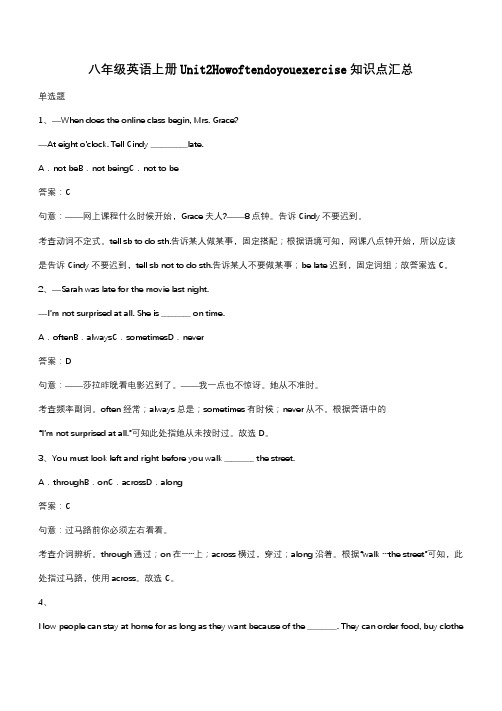
八年级英语上册Unit2Howoftendoyouexercise知识点汇总单选题1、—When does the online class begin, Mrs. Grace?—At eight o'clock. Tell Cindy __________late.A.not beB.not beingC.not to be答案:C句意:——网上课程什么时候开始,Grace夫人?——8点钟。
告诉Cindy不要迟到。
考查动词不定式。
tell sb to do sth.告诉某人做某事,固定搭配;根据语境可知,网课八点钟开始,所以应该是告诉Cindy不要迟到,tell sb not to do sth.告诉某人不要做某事;be late迟到,固定词组;故答案选C。
2、—Sarah was late for the movie last night.—I’m not surprised at all. She is ________ on time.A.oftenB.alwaysC.sometimesD.never答案:D句意:——莎拉昨晚看电影迟到了。
——我一点也不惊讶。
她从不准时。
考查频率副词。
often经常;always总是;sometimes有时候;never从不。
根据答语中的“I’m not surprised at all.”可知此处指她从未按时过。
故选D。
3、You must look left and right before you walk ________ the street. A.throughB.onC.acrossD.along答案:C句意:过马路前你必须左右看看。
考查介词辨析。
through通过;on在……上;across横过,穿过;along沿着。
根据“walk…the street”可知,此处指过马路,使用across。
故选C。
4、Now people can stay at home for as long as they want because of the ________. They can order food, buy clothes, have classes, ect.A.worldB.InternetC.supermarketD.restaurant答案:B句意:现在因为有了互联网,人们想待在家里多久就待多久。
八年级英语上册 Unit 2 How often do you exercise?单元知识归纳

Unit 2 How often do you exercise?课文翻译Section A 2dJack:Hi,Claire,are you free next week?Claire:①Hmm...next week is quite full for me,Jack.Jack:Really?How come?Claire:I have dance and piano lessons.Jack:What kind of dance are you learning?Claire:Oh,swing dance. It's fun!I have class once a week,every Monday.Jack:How often do you have piano lessons?Claire:Twice a week,on Wednesday and Friday.Jack:Well,how about Tuesday?Claire:Oh,I have to play tennis with my friends.But do you want to come?Jack:Sure!,杰克:你好,克莱尔,下周你有空吗?克莱尔:呣……下周我很忙,杰克。
杰克:真的吗?怎么会那样?克莱尔:我上舞蹈课和钢琴课。
杰克:你学习的是什么舞蹈?克莱尔:噢,摇摆舞。
很有趣!我一周上一次课,每周一上课。
杰克:你多久上一次钢琴课?克莱尔:一周两次,在周三和周五。
杰克:噢,周二怎么样?克莱尔:哦,我要与朋友打网球。
你想来参加吗?杰克:当然了!知识详解1.How often do you exercise?你多久锻炼一次?【解读】本句是含有特殊疑问词how often 的特殊疑问句。
【解读】how often 多久一次,用于对动作发生的频率进行提问。
回答应该是频度副词或表示频率的词组,如always,usually,often,sometimes,hardly,ever,never,every day,once a week,three times a day等。
八年级上册Unit_2_How_often_do_you_exercise综合练习题
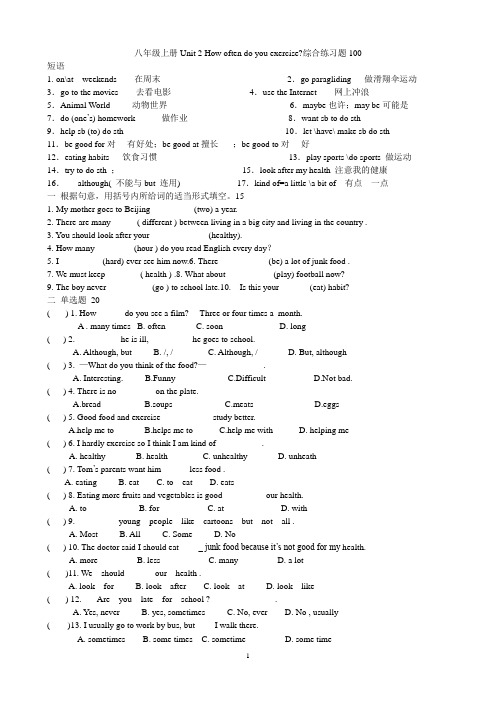
八年级上册Unit 2 How often do you exercise?综合练习题100短语1. on\at weekends 在周末2.go paragliding 做滑翔伞运动3.go to the movies 去看电影4.use the Internet 网上冲浪5.Animal World 动物世界6.maybe也许;may be可能是7.do (one’s) homework 做作业8.want sb to do sth9.help sb (to) do sth 10.let \have\ make sb do sth 11.be good for对----有好处;be good at擅长-----;be good to对----好12.eating habits 饮食习惯13.play sports \do sports 做运动14.try to do sth ;15.look after my health 注意我的健康16.although( 不能与but 连用) 17.kind of=a little \a bit of 有点一点一根据句意,用括号内所给词的适当形式填空。
151. My mother goes to Beijing__________(two) a year.2. There are many _____ ( different ) between living in a big city and living in the country .3. You should look after your_____________ (healthy).4. How many ________ (hour ) do you read English every day?5. I__________(hard) ever see him now.6. There ___________(be) a lot of junk food .7. We must keep _______ ( health ) .8. What about __________ (play) football now?9. The boy never __________(go ) to school late.10. Is this your ______ (eat) habit?二单选题20( ) 1. How ______do you see a film? ---Three or four times a month.A . many times B. often C. soon D. long( ) 2. __________he is ill,__________he goes to school.A. Although, butB. /, /C. Although, /D. But, although( ) 3. —What do you think of the food?—_____________.A. Interesting.B.FunnyC.DifficultD.Not bad.( ) 4. There is no ________ on the plate.A.breadB.soupsC.meatsD.eggs( ) 5. Good food and exercise ___________ study better.A.help me toB.helps me toC.help me withD. helping me( ) 6. I hardly exercise so I think I am kind of __________.A. healthyB. healthC. unhealthyD. unheath( ) 7. Tom’s parents want him ____ less food .A. eatingB. eatC. to eatD. eats( ) 8. Eating more fruits and vegetables is good _________ our health.A. toB. forC. atD. with( ) 9. _________ young people like cartoons but not all .A. MostB. AllC. SomeD. No( ) 10. The doctor said I should eat _____ junk food because it’s not good for my health.A. moreB. lessC. manyD. a lot( )11. We should ______ our health .A. look forB. look afterC. look atD. look like( ) 12. ---- Are you late for school ? -----________ .A. Yes, neverB. yes, sometimesC. No, everD. No , usually( )13. I usually go to work by bus, but ____I walk there.A. sometimesB. some timesC. sometimeD. some time( )14. You are too fat. You must __________ eat_________ meat and do more exercise.A.try,fewerB.try to, lessC.try to, fewerD.try, little( ) 15. He often gets up very late. He _________ takes exercise in the morning.A. alwaysB. usuallyC. hardly everD. quite often( )16. He’s a very lazy student, as a result, he always gets _______ grades.A. a goodB. highC. terribleD. an awful( )17. ----- ________ do you watch TV , Tom ? ----- Only once a week .A. How oftenB. How longC. How soonD. How much( )18. He tries _____ English . And he practices _________ English every day .A. to learn , to speakB. to learn , speakingC. learning , speaking( )19. If you want to be healthier, you must eat ____ junk food, I think.A. moreB. lessC. fewer D many( )20. Can you help me _____ the window ?A. cleaningB. with cleanC. of cleaningD. to clean三补全句子161. 他一个星期看三四次电视.He watches TV _______ ________ ________ ________ a week.2. 至于家务,我母亲做了大部分._______ ________ housework, my mother does most of it.3. 她从不锻炼,所以她很胖. She _______ exercises, so she is very fat.4. 他每天做锻炼. He exercises _________ ___________.5. 他一个月看一次电影. He goes to movies ________ ________ ________.6. 你多长时间打扫一次你的房间?How ____________ do you _____________ your room?7. 比尔周末通常做什么?____ _____ Bill usually do ____ ______?8. 你多久上一次网?每周两次。
八年级上 Unit_2_How_often_do_you_exercise_Section_A

always>usually>often>sometimes >hardly ever(几乎没有) >never play soccer after school
mak nnc !
He often plays soccer after school.
always>usually>often>sometimes >hardly ever(几乎没有) >never go skateboarding after school He sometimes goes skateboarding after school.
mak nnc !
always>usually>often>sometimes >hardly ever(几乎没有) >never
mak nnc !
She usually swims after school.
swim after school
a month September
I surf the Internet… four times a month.
Work in pairs.
A: How often do you …? B: Once a week/ Every day / Twice a month /Hardly ever / Never / Sometimes/…
A: How often do you …? TV? watch B: II… watch TV every day.n.节目 Healthy Living A: What’s your favorite program? B: It’s Animal World. … A: How often do you watch it? English Today B: Once a week. …
八年级英语上册Unit-2-How-often-do-you-exercise知识点归纳

八年级英语上册Unit 2 How often do you exercise知识点归纳八年级英语上册Unit 2 How often do you exercise知识点归纳一、词组、短语:1、help with housework 帮助做家务活,2、go shopping 购物,3、on weekends 在周末,4、how often 多久一次,5、hardly ever几乎不,6、once a week 每周一次,7、twice a month每月二次,8、go to the movies去看电影,9、every day 每天,10、use the Internet上网/用网,11、be free有空,12、have dance and piano lessons 上舞蹈钢琴课,13、swing dance摇摆舞14、play tennis 打网球,15、stay up late熬夜,16、at least至少,17、go to bed early 早睡,18、 play sports 锻炼身体,19、be good for 对…有好处,20、go camping去野营,21、in one’s free time 在某人的空闲时间,22、not….at all 根本不,23、the most popular 最流行,24、such as例如,25、go to the dentist去看牙医,26、more than 超过/多于,27、Old habits die hard.旧习惯难改。
28、 hard=difficult 困难的,29、less than 少于/不到二、重要句子(语法):What do you usually do on weekends你周末通常做什么 I always exercise.总是锻炼身体。
What do they do on weekends他们周末干什么 They often help with housework.他们经常帮助干家务活。
人教新目标八年级英语上册思维导图课堂笔记Unit 2 How often do you exercise

Unit 2 How often do you exercise?2013版人教新目标八年级英语上册思维导图课堂笔记1. housework n. 家务劳动;家务事We should help our mothers do the housework. 我们应该帮助妈妈做家务。
不可数名词do the housework做家务homework家庭作业homework家庭作业workhouse劳动救济所schoolwork课堂作业workplace工作场所workhorse吃苦耐劳的人workbook练习册2. hardly adv. 几乎不;几乎没有There’s hardly any tea left. 没有剩下什么茶。
表否定,改反意疑问句时,疑问部分用肯定形式This boy hardly eats junk food,does he?=almost nothardadv.努力地;艰难地adj.困难的3. ever adv. 在任何时候;从来;曾经Don’t you ever get tired? 难道你从来不累吗?hardly ever几乎从不ever since自从常用于疑问句和否定句中neveradv.从不,从来没有4. once adv. 一次,曾经The farmers here sow once a year. 这里的农民一年播种一次。
once a week一周一次意为“曾经”时,常与过去时连用。
位于行为动词之前、系动词之后。
He once lived in Hangzhou.This book was famous once,but now nobody reads it.5. twice adv. 两次,两倍I go shopping twice a week. 我一个星期购物两次。
Cats sleep twice as much as people. 猫睡觉的时间是人的两倍。
八年级上 Unit_2_How_often_do_you_exercise_Section_A

e. __ read 2
once a month
twice a month
2b
Activities
a. go to the movies
How often
every day
b. watch TV
c. shop
once a week
twice a week
d. exercise
e. read
three times a week
Tues.
Wed.
Thur.
Fri.
Sat.
Sun.
How often do you exercise? I exercise… three times a week.
time: n. 次数(可数) three times a week: 一周三次
_____________ do you surf the Internet? How often
What do you usually do on weekends? does she
I She usually … goes shopping go on weekends.
go shopping: 购物 = do some shopping = shop
What do you usually do on weekends? does he
at least =/= at most 至少 He plays computer games at least one hour every day. least----less---little most ---more--much
How often do you help with I always help with housework. housework
八年级英语上册Unit2Howoftendoyouexercise知识点归纳

八年级英语上册Unit 2 H ften d uexerise?知识点归纳八年级英语上册Unit2Hftenduexerise?知识点归纳一、词组、短语:一、helpithhuser帮忙做家务活,二、gshpping购物,3、neeends在周末,4、hften多久一次,、hardlever几乎不,六、neaee每周一次,7、tieanth每一个月二次,八、gtthevies去看电影,九、everda天天,10、usetheInternet上网/用网,1一、befree有空,1二、havedaneandpianlessns上舞蹈钢琴,13、singdane摇摆舞14、platennis打网球,一、stauplate熬夜,1六、atleast至少,17、gtbedearl早睡,1八、plasprts锻炼躯体,1九、begdfr对…有益处,20、gaping去野营,2一、inne’sfreetie在某人的空闲时刻,2二、nt…atall全然不,23、thestppular最流行,24、suhas例如,二、gtthedentist去看牙医,2六、rethan超过/多于,27、ldhabitsdiehard旧适应难改。
2八、hard=diffiult困难的,2九、lessthan少于/不到二、重要句子(语法):hatduusualldneeends?你周末通常做什么?Ialasexerise老是锻炼躯体。
hatdthedneeends?他们周末干什么?Theftenhelpithhuser他们常常帮忙干家务活。
hatdesshedneeends?她周末干什么?Shesetiesgesshpping她有时购物。
Hftendugtthevies?你多久看电影一次?Igttheviesabeneanth可能一个月看一次。
HftendesheathTV?他多久看电视一次?HehardleverathesTV他几乎不看电视。
英语人教版八年级上册_教材目录及单词

2013年新目标英语人教版初二上册八年级英语上册目录之杨若古兰创作UNIT 1 Where did you go on vacation?Unit 2 How often do you exercise?Uuit 3 I'm more outgoing than my sister.Unit 4 What's the best movie theater?Unit 5 Do you want to watch a game show?Unit6 I'm going to study computer science.Unit 7 Will people have robots?Unit 8 How do you make a banana milk shake?Unit 9 Can you come to my party?Unit10 If you go to the party,you 'll have a great time!2013年新目标八年级上册各单元英语单词Unit1 Where did you go on vacation?anyone ['eniwʌanywhere ['eniweə(r)] adv.任何地方n.任何(一个)地方wonderful ['wʌndəfl] adj.精彩的;极好的few [fjuːmost [məʊst] adj.最多的;大多数的;something ['sʌmθɪŋ] pron.某事物;nothing(=not…anything) ['nʌθɪmyself [maɪeveryone ['evriwʌn] pron.每人;人人yourself [jɔː'self] pron.你本人;你亲自hen [hen] n.母鸡;雌禽bored [bɔːd] adj.无聊的;腻烦的;愁闷的diary ['daɪəri] n.日记;日记簿(keep a diary)seem [siːm] vi.似乎;好像someone ['sʌmwʌn] pron.某人;有人quite a few相当多;很多(后接可数名词)of course [əvkɔːs] 当然activity [æk'tɪvəti] n.活动;活跃decide [dɪ'saɪd] v.决定;选定(decide to do sth.)try [traɪ] v.测验考试;设法;努力(try to do sth. /try doing sth.) bird [bɜːd] n.鸟;禽paragliding ['pærəɡlaɪdɪbicycle ['baɪsɪbuilding ['bɪldɪtrader ['treɪdə(r)] n.商人;商船wonder ['wʌndə(r)] v.惊奇;想晓得;怀疑difference ['dɪfrəns] n.差别;分歧top [tɒp] n.顶部;顶wait [weɪt] v.等;等待(wait for)umbrella [ʌm'brelə] n.伞;雨伞wet [wet] adj.湿的;雨天的below [bɪ'ləʊas [əz] conj.如同;像...一样enough [ɪ'nʌf] adj.足够的adv.足够地;充分地duck [dʌk] n.鸭肉;鸭hungry(反full) ['hʌŋɡri] adj.饥饿的;渴望的feel like(doing sth.)想要dislike [dɪs'laɪk] v.不爱好;讨厌n.不爱好;讨厌;反感Unit2How often do you exercise? housework ['haʊswɜːhardly ['hɑːdli] adv.几乎不;简直不;刚刚ever ['evə(r)] adv.曾;在任何时候once [wʌns] adv.一次;曾twice [twaɪs] adv.两倍;两次Internet ['ɪprogram ['prəʊɡræm]n.节目;程序;课程;节目单full [fʊl] adj.满的;充满的;完整的swing [swɪŋ] n.扭捏;秋千v.扭捏;扭转maybe ['meɪbi] adv.或许;或许;可能swing dance扭捏舞least [liːst] adj.最小的;起码的at least至多hardly ever很少;几乎从不;难得junk n.垃圾;废旧杂物coffee ['kɒfi] n.咖啡;咖啡色health [helθ] n.健康;人的身体或精神形态result [rɪ'zʌlt] .结果;后果percent [pə'sent] adj.百分之...的online [ˌɒn'laɪtelevision ['telɪvɪʒn] n.电视机;电视节目although [ɔːl'ðəʊ] conj.虽然;尽管;然而;可是through [θruː] prep.穿过;凭借;不断到body ['bɒmind [maɪnd] .头脑;设法;定见;心思such [sʌtʃ] adj.如许的;如此的together [tə'ɡeðə(r)] adv.共同;一路die [daɪ] v.死;枯竭;消逝writer ['raɪtə(r)] n.作者;作家dentist ['dentɪmagazine ['mæɡəziːhowever [haʊ'evə(r)] adv.然而;不管如何;不管多么almost ['ɔːlməʊst] adv.几乎;差不多none [nʌn] pron.没有人;没有任何东西,毫无less [les] adj.更少的;较少的point [pɔɪnt] n.看法;要点;重点;小数点;目标;分数such as例如;诸如junk food n.垃圾食品;无养分食品more than超出;多于;不但仅;非常less than不到;少于point n. 得分,点Unit3I'm more outgoing than my sister.outgoing ['aʊtɡəʊɪloudly ['laʊdli] adv.大声地;高声地;花俏地quietly ['kwaɪətli] adv.宁静地;悄悄地;平静地hard-working [hɑːd'wɜːkɪŋ] adj.勤勉的;努力工作的competition [ˌkɒmpə'tɪʃn] n.竞争;角逐fantastic [fæn'tæstɪk] adj.极好的;了不起的which adj.哪一个;哪一些pron.哪一个;哪些clearly ['klɪəli] adv.清楚地;明显地win [wɪcare about关心talented ['tæləntɪd] adj.有才干的;有天赋的truly ['truːli] adv.真实地;朴拙地;准确地care [keə(r)] v.关心;担忧;赐顾帮衬;在意serious ['sɪəriəs] adj.严厉的;严重的;持重的mirror ['mɪrə(r)] n.镜子;反映necessary ['nesəsəri] adj.须要的;必定的both [bəʊshould [ʃəd] aux.应当;可能;该当;将要touch [tʌtʃ] vt.触摸;感动reach [riːtʃ] v.到达;伸出;达成;取得联系;延长;(伸手)去够heart [hɑːt] n.心脏;内心fact [fækt] n.事实;本相;实际break [breɪk] v.打碎;折断;背背;解决;间断laugh [lɑːf] v.发笑;笑;讥笑n.笑声;笑;笑料similar ['sɪshare [ʃeə(r)] vt.分享,共享;分配;共有loud [laʊd] adj.大声的;adv.大声地;洪亮地primary ['praɪməri] adj.最初的,最早的be different from和...分歧information [ˌɪnfə'meɪʃn] n.信息;情报;材料;通知as long as只需bring out拿出;推出the same as与...同样的in fact事实上;实际上;确切地说be similar to类似于;与...类似Unit4 What's the best movie theater? theater ['θɪətə] n.剧场;电影院;剧场comfortable ['kʌmftəbl] adj.舒适的;充裕的seat [siːt] n.坐位;screen [skriːn] n.屏幕;银幕close [kləʊs] v.关;合拢;不开放;停业worst [wɜːst] adj.最坏的;最差的cheaply ['tʃiːpli] adv.廉价地;粗俗地song [sɒŋ] n.歌曲;歌唱choose [tʃuːz] v.选择;决定carefully ['keəfəli] adv.当心肠,认真地reporter [rɪ'pɔːfresh [freʃ] adj.新颖的;清新的comfortably ['kʌmftəbli] adv.舒服地;容易地;充裕地worse [wɜːs] adj.更坏的;更差的service ['sɜːvɪpretty ['prɪmenu ['menjuːact [ækt] v.行动;扮演meal [miːl] n.一餐;膳食so far到目前为止;迄今为止no problem没什么;不客气creative [kri'eɪtɪv] adj.创造的,创造性的;performer [pə'fɔːmə(r)] n.扮演者;履行者talent ['tælənt] n.天赋;才干,才艺;common ['kɒmən] adj.罕见的;共同的;普通的magician [mə'dʒɪʃn] n.魔术师;术士beautifully ['bjuːtɪfli] adv.美丽地;完满地;role [rəʊl] n.感化;角色winner ['wɪprize [praɪz] n.奖品;奖金everybody ['evribɒdi] pron.每人;人人example [ɪɡ'zɑːmpl] n.例子;典范poor [pɔː(r)] adj.可怜的;贫穷的seriously ['sɪəriəsli] 严重地,严厉地give [ɡɪv] v.给;赠予;送crowded ['kraʊdɪhave…in common有不异特征all kinds of各种各样;各品种型be up to是…….的职责;由…….决定play a role发挥感化;有影响makeup假造for example例如take…seriously认真对待Unit5Do you want to watch a game show? sitcom ['sɪtkɒm] n.情景悲剧(= situation comedy)news [njuːz] n.旧事;动静soap [səʊp] n.肥皂;肥皂剧educational [ˌedʒu'keɪʃənl]adj.教育的;有教育意义的plan [plæn] n.计划;方法v.打算;计划hope [həʊdiscussion [dɪ'skʌʃn] n.讨论;谈论stand [stænd] v.站立;忍受happen ['hæpən] vi.发生;碰巧;出现;偶遇may [meɪ] aux.可以,能够;可能,或许expect [ɪk'spekt] v.预期;期待;盼望joke [dʒəʊk] n.笑话;打趣v.说笑话;开打趣comedy ['kɒmədi] n.悲剧;滑稽;滑稽事件find out查明、弄清meaningless ['miːnɪŋləs] adj.有意义的;不次要的action ['ækʃn] n.行为;活动cartoon [kɑː'tuːn] n.卡通;漫画culture ['kʌltʃə(r)] n.栽培;文明;教养famous ['feɪməs] adj.闻名的;着名的appear [ə'pɪə(r)] vi.出现;出版;显得become [bɪ'kʌm] v.酿成;成为rich [rɪtʃ] adj.富有的;富饶的;丰富的successful [sək'sesfl] adj.成功的;美满的might [maɪt] aux.可能;或许;may的过去式main [meɪn] adj.次要的;最次要的reason ['riːzn] n.缘由;理由film [fɪunlucky [ʌn'lʌki] adj.倒霉的;不幸的;不吉利的lose [luːready ['redi] adj.筹办好的;乐意的character ['kærəktə(r)] n.个性;品质;人物;simple ['sɪmpl]adj.简单的;朴素的;单纯的;笨的army ['ɑːmi] n.军队;陆军;一大批action movie动作片be ready to情愿敏捷做某事dress up打扮;乔装打扮take sb.’s place代替;替换do a good job工作干得好;做得好Unit6I'm going to study computer science.doctor ['dɒktə(r)] 大夫engineer [endʒɪ'nɪr] 工程师violinist [ˌvaɪə'lɪnɪst] 小提琴手pilot ['paɪlət] 飞行员pianist ['pɪənɪst] 钢琴家scientist ['saɪəntɪst] 科学家college ['kɑːlɪdʒ] 大学education [ˌedʒu'keɪʃn] 教育medicine ['medsn] 药,医学university [ˌjuːnɪ'vɜːrsəti] 大学,高等学府article ['ɑːrtɪkl] 文章,论文send [send] 邮寄,发送grow up长大成长computer programmer计算机管理员be sure about确信make sure确保resolution [ˌrezə'luːʃn] 决心,决定foreign ['fɔːrən] 本国的able [ˌebəl] 能够discuss [dɪˌskʌs] 讨论,商量promise [ˌprɑmɪs] 承诺,诺言beginning [bɪˌɡɪnɪŋ] 开头,开端improve [ɪmˌpruv] 改进,改善physical ['fɪzɪkl] 身体的self-improvement [selfɪmp'ruːvmənt] 自我改进,自我提高hobby ['hɑːbi] 专业快乐爱好own [oʊn] 本人的,本人的,具有personal ['pɜːrsənl] 个人的,私人的relationship [rɪ'leɪʃnʃɪp] 关系write down写下have to do with关于;与……有关系take up学着做;开始做agree with同意be able to能够做某事Unit 7 Will people have robots? paper ['peɪpər] 纸pollution [pə'luːʃn] 净化;净化物prediction [prɪ'dɪkʃn] 猜测future ['fjuːtʃər] 将来pollute [pə'luːt] 净化environment [ɪn'vaɪrənmənt] 环境planet ['plænɪt] 行星earth [ɜːrθ] n.地球;泥土plant [plænt] 莳植,植物part [pɑːrt] 介入,部分peace [piːs] 和平sky [skaɪ] 天空play apart介入astronaut ['æstrənɔːt] 宇航员apartment [ə'pɑːrtmənt] 公寓房间rocket ['rɑːkɪt] 火箭;space [speɪs] .空间;太空even ['iːvn] 甚至;越发human ['hjuːmən] 人的;n.人;人类servant ['sɜːrvənt] 仆人dangerous ['deɪndʒərəs] 风险的already [ɔːl'redi] 曾经factory ['fæktri] 工厂believe [bɪ'liːv] 信赖disagree [ˌdɪsə'ɡriː] 分歧意shape [ʃeɪp] 外形fall [fɔːl] 倒塌;跌倒possible ['pɑːsəbl] 可能的probably ['prɑːbəbli] 大概;或许;很可能holiday ['hɑːlədeɪ] 假日word [wɜːrd] 单词;space station太空站over and over again多次;反复地hundreds of很多;大量;成百上千fall down突然倒下;跌倒;倒塌look for寻觅;追求Unit 8 How do you make a banana milk shake? blender ['blendər] 搅拌器;果汁机peel [piːl] vt.剥落;削皮pour [pɔːr] pour [pɔːr] 倒;倾倒yogurt ['joʊɡərt] 酸奶;honey ['hʌni] 蜂蜜watermelon ['wɔːtərmelən] 西瓜spoon [spuːn] 勺,调羹add [æd] 添加finally ['faɪnəli] 最初,终极salt [sɔːlt] 盐sugar ['ʃʊɡər] 糖cheese [tʃiːz] 干酪,奶酪popcorn ['pɑːpkɔːrn] 爆米花corn [kɔːrn] 玉米,谷物machine [mə'ʃiːn] 机器sandwich ['sænwɪtʃ] 三明治butter ['bʌtər] 黄油,奶油turkey ['tɜːrki] 火鸡lettuce ['letɪs] 莴苣,生菜piece [piːs] 件;篇;片;块;traditional [trə'dɪʃənl] 传统的traveler ['trævlə] 旅行者England ['ɪŋɡlənd] 英格兰;英国celebrate ['selɪbreɪt] 庆祝;庆贺pepper ['pepər] 胡椒粉;辣椒oven ['ʌvn] 烤箱;烤炉cover ['kʌvər] 粉饰,盖子,gravy ['ɡreɪvi] 肉汁;肉汤serve [sɜːrv] 接待,服务temperature ['temprətʃər] 温度,气候Unit 9 Can you come to my party? prepare [prɪ'per] v.豫备;筹办exam [ɪɡ'zæm] 考试available [ə'veɪləbl] 可得到的;有空的;hang [hæŋ] 吊挂;(使)低垂until [ən'tɪl] 直到...的时候;直到…为止catch [kætʃ] 赶上;捉住;捕获invite [ɪn'vaɪt] 约请accept [ək'sept] 接受;refuse [rɪ'fjuːz] 拒绝invitation [ˌɪnvɪ'teɪʃn] 约请;约请函reply [rɪ'plaɪ] 回答,回复forward ['fɔːrwərd] 转交;发送,向前的delete [dɪ'liːt] 删除preparation [ˌprepə'reɪʃn] 筹办,筹办工作opening ['oʊpnɪŋ] 开幕式,落成典礼guest [ɡest] 客人concert ['kɑːnsərt] 音乐会headmaster [ˌhed'mæstər] 校长event [ɪ'vent] 大事,公开活动calendar ['kælɪndər] 日历,日程表Unit10 If you go to the party,you 'll have a great time! video ['vɪdioʊ] 录像,录像带organize ['ɔːrɡənaɪz] 组织,筹备chocolate ['tʃɑːklət] 巧克力upset [ʌp'set] 难过,失望advice [əd'vaɪsɪ] 劝告,建议travel ['trævl] 旅行agent ['eɪdʒənt] 代理人,经纪人expert ['ekspɜːrt] 专家,能手teenager ['tiːnˌeɪdʒə] 青少年normal ['nɔːrml] 正常的unless [ən'les] 除非,如果不certainly ['sɜːrtnli] 当然,肯定wallet ['wɑːlɪt] 皮夹,钱包worried ['wɜːrid] 担心的,烦恼的angry ['æŋɡri] 生气的,发怒的careless ['kerləs] 粗心的,不当心的understanding [ˌʌndər'stændɪŋ] 善解人意的,体谅人的trust [trʌst] 信赖,信赖mistake [mɪ'steɪk] 错误,失误careful ['kerfl] 当心的,过细的advise [əd'vaɪz] v劝告,建议solve [sɑːlv] 解决;解答experience [ɪk'spɪriəns] 信赖,经历halfway [ˌhæf'weɪelse [els] 此外,其他的。
2013版八年级上册英语unit2课文重难点讲解
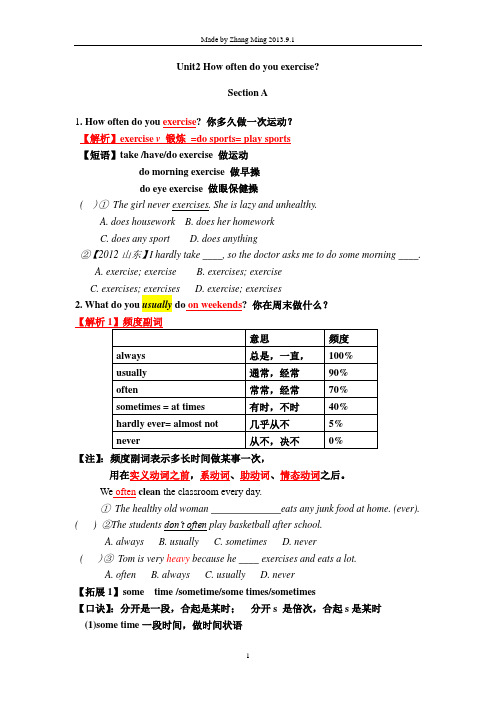
Unit2 How often do you exercise?Section A1. How often do you exercise? 你多久做一次运动?【解析】exercise v锻炼=do sports= play sports【短语】take /have/do exercise 做运动do morning exercise 做早操do eye exercise 做眼保健操( )①The girl never exercises. She is lazy and unhealthy.A. does houseworkB. does her homeworkC. does any sportD. does anything②【2012山东】I hardly take ____, so the doctor asks me to do some morning ____.A. exercise; exerciseB. exercises; exerciseC. exercises; exercisesD. exercise; exercises2. What do you usually do on weekends? 你在周末做什么?【注】:频度副词表示多长时间做某事一次,用在实义动词之前,系动词、助动词、情态动词之后。
We often clean the classroom every day.①The healthy old woman ______________eats any junk food at home. (ever). ( )②The students don’t often play basketball after school.A. alwaysB. usuallyC. sometimesD. never( )③Tom is very heavy because he ____ exercises and eats a lot.A. oftenB. alwaysC. usuallyD. never【拓展1】some time /sometime/some times/sometimes【口诀】:分开是一段,合起是某时;分开s 是倍次,合起s是某时(1)some time一段时间,做时间状语It t akes sb some time to do sth 做某事花费某人多长时间(2) sometime adv在某个时候,(3) some times 名词词组,“几次,几倍”(4) sometimes=at times 有时(一般现在时的标志词)()①I hope to visit the USA _____ in the future.A. sometimesB. some timesC. sometimeD. some time()②They sometimes go to the movies on Saturday.A. many timesB. at timesC. one timeon weekends = on Saturday and Sunday 在周末on weekdays= from Monday to Friday 在工作日( ) The teachers never arrive late for work from Monday to Friday.A. on weekdaysB. on weekendsC. every dayD. five times a week.3.hard (1)adv 努力地,猛烈地work hard 努力工作study hard 努力学习(2) adj.困难的,艰难的=difficult◆It’s hard/difficult for sb to do sth 做某事对某人来说是困难的It’s hard for us ____________(finish) the work without other’s help.【拓展】hard ly adv “几乎不,从来不” ,表否定意义,常与can ,any ,ever 连用。
八年级上册Unit2__How_often_do_you_exercise
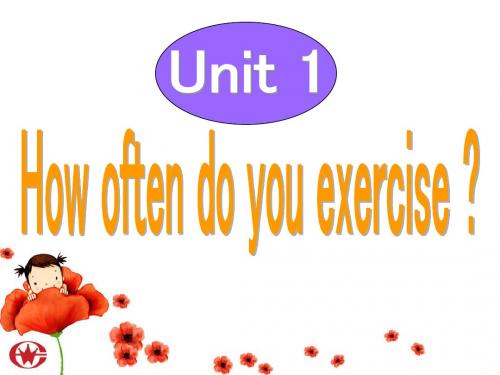
U
;练习
C
1.exercise = do some exercise 进行锻炼
How often do you exercise ?
你通常多久锻炼一次?
2. do morning exercises 做早操
do class-between exercises
做课间操
do eye-exercises 做眼保健操
Cf, I watch TV three times a week. → How often do you watch TV ?
Using always…
Talk about activities
go skateboarding
go skating
go fishing
go swimming
go shopping
How often do you…?
3 5 4 2
Reporter: So Cheng, how often do you watch TV?
Cheng: Cheng: Cheng: Cheng: Cheng:
Hmmmm… about _____________ twice a week , I guess.
hardly ever once a month twice a week three times a month
A: How often do you watch TV ? B: Every day .
A: What‟s your favorite
program?
B: It‟s Animal World .
skateboarding e 1. ___________________
d watching TV 2. ___________________ c exercising 3. ___________________________
八年级上册英语Unit_2_How_often_do_you_exercise知识点总结

Unit 1 How often do you exercise?【知识梳理】I. 重点短语 1. go to the movies=go to the cinema 看电影2. look after=take care of 照顾3. surf the Internet 上网4. healthy lifestyle 健康的生活方式5. go skateboarding 去划板6. (be) in good health =(be)healthy 身体健康7. keep healthy=keep in good health 保持健康8. as for 至于9. take/do exercise=play/ do sports 锻炼,做运动10. eating habits 饮食习惯11. the same as 与……相同12. once a month 一月一次13. be different from 不同14. twice a week 一周两次15. make a difference to 对什么有影响16. how often 多久一次17. although=though 虽然18. most of the students=most students 大多数学生19. activity survey 活动调查20. go shopping=do some shopping 购物21. do homework 做家庭作业22. do housework 做家务事23. junk food 垃圾食物24. be good/bad for 对……有益(害)25. on/at weekends 在周末26. want to do sth=would like to do sth =feel like doing sth 想要做某事27. want sb to do sth = would like sb to do sth 想要某人做某事28. try to do sth 尽量做某事try doing sth. 试着做某try one‟s best to do sth. 尽力做某事29. come home from school 放学回家30. of course=certainly=sure 当然31. get good grades 取得好成绩32. help sb (to)do sth 帮助某人做某事,33. help sb with sth 在某方面帮助某人34. a lot of =lots of=many /much 许多,大量的35.as for 至于;关于36.how many 多少(针对可数名词)37.how much 多少(针对不可数名词)38.of course = sure 当然;确信39.every day 每一天40.every night 每晚41.hardly ever 几乎不42.be good for one's health 有益健康43.try to do sth. 尝试做某事44.kind of 有点II. 重要句型 1 How often do you exercise? 你多久锻炼一次?2 Three to six times a week 每周三到六次3 How long do you sleep every night? 你每天睡几个小时?4.I sleep more than 5 hours every night 多于5小时5. How often do you eat fruit and vegetables? 你多久吃一次水果和蔬菜?6.What do you usually do on weekends?你周末通常做什么?7.I usually play soccer 我通常踢足球8.What is your favorite program?你最喜欢的节目是什么?9.Some students are very active,they exercise every day一些学生非常的活泼,每天都运动.10.As for homework,most students do it every day关于作业,大多数学生每天都做.III. 交际用语询问别人做某事的频繁程度IV. 重要语法频率副词一For about three years.大约三年.(2)how soon意为“多久以后”.多用于将来时间,其答语为in+一段时间.—How soon will your mother come back?你妈妈多久以后回来?一She will be back in ten minutes.她十分钟以后回来.(3)how many times意为“多少次”,它只询问次数,即“多少次”.常用once一次,twice两次,three times三次等回答.一How many times did you get to Beijing?你去北京几次了?—Oh,four times.哦,四次了.(4)how far意为“离……多远”,多用来询问路程.How far is it from your school to your home?你家距离学校有多远?【易混辨析】house, family ,home(1)house一般指所居住的建筑物,即“房子,住宅”.His house was burned in a big fire.他的房子在一场大火中被烧毁了.(2)family着重指家庭成员.My family are au here.我们一家都在这儿.(3)home则指某人出生及生活的环境,包括住处及家人.He left home at the age of 18.他18岁离开了家.4.trytry to do sth.试图做某事,想要做某事try one's best竭尽所能She tries to learn English.她试着去学英语.Jack tries his best to win the game.杰克尽他最大的努力去赢这场比赛.5. a lot of, many, much三者都可表示“许多”,a 10t 0f既可修饰可数名词,也可修饰不可数名词;many修饰可数名词复数;much 修饰不可数名词.We have a lot of friends.---We have many friends.我们有许多朋友.Do you have a lot of money?=Do you have much money?你有许多钱吗?在修饰可数名词复数时,a lot/lots of可与many互换;在修饰不可数名词时,alot/lots of可与much互换.但a lot/lots of一般不用于否定句和疑问句中,在这两类句子中要用many或much.6.kind ofkind of后接形容词或副词,意为“有点,有几分”.He felt kind of tired.他感觉有点累.The like is kind of expensive.那辆自行车有点贵.(1)a kind of+ m一种This kind of question is hard to answer.这种问题很难回答.(2)all kinds《+n.各种各样的There are all kinds of flowers iIl the park.公园里有各种各样的花.(3)different kinds of+n.不同种类的There a地different kinds of animals in the zoo.动物园里有不同种类的动物.7.Maybe ,perhaps, likely possible, probablymaybe. perhaps和probably都有“也许,大概”的意思.perhaps也许,大体和possibly同义;probably大概,肯定的成分较大,是most likely的意思;possibly可能,常和call,may,must等情态动词连用,比probably语气弱得多;maybe或许,比perhaps普通,但不庄重;likely或许,通常与most,very连用.8.although , thoughalthough和though作连词用,意为“尽管,虽然”,二者可以通用.Although/Though they are so poor ,they have enough to eat·他们虽然穷,食物还是够吃的.注意:在一个句子中,用了although或though就不能用but了,用了but则不能用although或though,即:“虽然……但是……”不见面,但是可以用yet.9.hard, hardlyhard既可作形容词,也可作副词,其词义丰富;hardly是具有“几乎没有,几乎不”这种否定含义的独立副词. ms ground is too bard to dig.这块地太硬,挖不动.(adj.)Chinese is hard t0 learn for foreigners.对于外国人来说汉语很难学.(adj.)You should study hard.你应该努力学习.(adv.)There is hardly any coffee left.几乎没剩下什么咖啡了.(adv.)Hardly anybody came.几乎没有什么人来. (adv.)【中考连线】①一Do you have any plans for your summer vacation?一I am ____for London next Sunday.A.going to B.leaving C. will go答案:B点拨:leave for意为“动身去某地”,故选B.②(2009·浙江湖州中考)---___do you visit your uncle?----Once a week, at least.A.How long B.How manyC.How often D .How soon答案:C点拨:本题考查疑问词的用法.由答语“至少一周一次”可知用how often how long “多久”;how m any'…多少”;how soon'…多久”.③(2009·淄博中考)--Would you mind ____my little sister while I‟II away?--Of course not.A.looking for B. looking atC. looking afterD. looking forward to答案:C点拨:由题意“当我不在时,你介意照顾一下我妹妹吗?”知选looking after.④《2009·河北中考)--___can you be ready ,Andy?一In ten minutes. .A.How much B.How oftenC.How long D .How soon答案:D点拨:how much多少.提问不可数名词或价格;How often多久一次;how long多久,多长;how soon多久,用于将来时态.由答语in ten minutes“在l0分钟之后”知选D.1. How often do you shop? 疑问词how的用法(1)怎样,用什么手段,方法/交通工具How are you? / How is she?How did he do it? / I don‟t know how to swim.How do you come to school?(2) 情况如何(指身体健康状况)How are you?(3) how many,how much表示“多少”how many后接可数名词复数,how much接不可数名词。
八年级英语上册 Unit 2 How often do you exercise?(第1课时)说课稿

八年级英语上册 Unit 2 How often do you exercise?(第1课时)说课稿一. 教材分析八年级英语上册Unit 2 How often do you exercise?主要讨论了人们日常的锻炼习惯。
本节课的主要内容是掌握频率副词,学会用一般现在时询问和回答别人锻炼的习惯,并能够用一般现在时描述自己的锻炼习惯。
教材通过丰富的语境和真实的场景,让学生在实际情境中学习和使用英语,提高学生的语言运用能力。
二. 学情分析八年级的学生已经掌握了基本的英语语法和词汇,具备一定的听说读写能力。
但是,学生在使用英语进行实际交流时,还存在着一定的困难,特别是在描述日常生活习惯方面。
因此,教师需要通过创设真实情境,让学生在实际交流中提高自己的英语水平。
三. 说教学目标1.知识目标:学生能够掌握频率副词,学会用一般现在时询问和回答别人锻炼的习惯,并能够用一般现在时描述自己的锻炼习惯。
2.能力目标:学生能够在真实情境中运用所学知识进行交流,提高自己的语言运用能力。
3.情感目标:培养学生热爱生活,注重锻炼的良好习惯。
四. 说教学重难点1.重点:频率副词的运用,一般现在时的疑问句和回答句的构成。
2.难点:如何正确运用频率副词和一般现在时描述自己的锻炼习惯。
五. 说教学方法与手段1.采用任务型教学法,通过设定真实情境,让学生在完成任务的的过程中,学习和运用所学知识。
2.利用多媒体教学手段,如图片、视频等,为学生提供丰富的视觉和听觉信息,激发学生的学习兴趣。
3.分组讨论法,让学生在小组内互相交流,提高学生的合作能力和语言运用能力。
六. 说教学过程1.导入:通过提问学生日常生活中喜欢的运动,引出本节课的主题。
2.新课呈现:通过展示图片和视频,引入频率副词和一般现在时的概念。
3.课堂讲解:讲解频率副词的用法,一般现在时的疑问句和回答句的构成。
4.实践环节:学生分组讨论,用英语描述自己的锻炼习惯,教师巡回指导。
2013英语八年级上unit2_How_often_do_you_exercise单元课件

3c.What can you do to improve your English? Add more things to the chart. Then ask your classmates the questions and find the best English student.
How often do you…
2d.According to the article and the pie charts, write sentences
with the percentages using always, usually or sometime
1.90%:Ninety percent of the students always use the Internet. 2.85%:____________________________________________________ Eighty-five percent of the students watch TV every day.
1c.Listen to an interview about two people’s daily habits. Circle your answer to each question.
Does Tina have good habits? Yes.
Does Bill have good habits? Yes.
A:What’s your favorite program? B:Animal World.
A:How often do you watch it?
B:Twice a week.
2d.Role-play the conversation.
- 1、下载文档前请自行甄别文档内容的完整性,平台不提供额外的编辑、内容补充、找答案等附加服务。
- 2、"仅部分预览"的文档,不可在线预览部分如存在完整性等问题,可反馈申请退款(可完整预览的文档不适用该条件!)。
- 3、如文档侵犯您的权益,请联系客服反馈,我们会尽快为您处理(人工客服工作时间:9:00-18:30)。
4. He is talking to his father.
(用usually改写句子) usually _____ talks to his father. He _______ 5. My father often reads newspaper
after supper.(画线提问) What _____ does _____ your father often ____ do _____ after supper?
Healthy/unhealthy lifestyle?
Lisa sleeps eight hours every night. She eats a good breakfast and she exercises every day. She never eats junk food.
读一读, 判断谁的生活 健康?
Healthy/unhealthy lifestyle?
Pam likes to watch TV. On weekends, she never exercises and she doesn’t like fruit or vegetables. She eats junk food. And Pam never goes to the doctor.
C. for; healthy
D. for; health
3. — _______ A do you go skating? — Every day.
A. How often
every day.
B. How many C. When
B exercise 4. Most students in my class ____
Write a report about your good and bad habits. Say how often you do things. Use the report in 3a as an example.
One possible version:
I have lots of good habits. I exercise every day. I always read books. I eat fruit every day. I drink milk twice a week. I never stay up late. But I have some bad habits, too. I always watch TV for two hours a day. I use the Internet twice a week. I hardly ever help with housework. I never go to the dentist.
Exercise Read books Good Eat fruit habits Drink milk Stay up late
Habits
Activities
How often
always
Watch TV for over 2 hours Use the Internet Bad Eat junk food habits Help with housework Go to the dentist
Healthy/unhealthy lifestyle?
Tom is tall and thin. He plays tennis three times a week and he runs every day. He never watches TV. He eats fruit and vegetables every day and sleeps nine hours every night.
2.Is the information about the girl? What is her name ?
3 . Wh at does th e he ad in g "D ay`s a year"mean ? 4.What good habits does the girl have?
5.Does the girl have any bad habits? What are they?
However, she has some bad habits, too. always watches TV for more than She _______ sometimes eats two hours a day, and she __________ hamburgers. Her parents are not very ever helps with happy because she hardly __________ housework and she ______ never goes to the dentist for teeth cleaning. She says she is afraid.
Jane is a 16-year-old high school student in the United States. American Teenager magazine asked her about her habits. Jane has a lot of good habits. She always every day exercises and she reads books ________. Also, she ________drinks juice and she usually __________ hardly ever stays up late.
(谚语)Early to bed, early to rise, makes a man healthy, wealthy(富有的) and wise( 聪明的).
Homework
以My habits(good habits and bad habits)
为题目写一篇短文。(字数不少于50字)
between the two pictures.
5. He ____________ hardly ever (几乎不) goes to a
restaurant for dinner. drink (喝) 6. Katrina doesn't often _______ coffee, she likes green tea. habits 习惯) are not 7. My eating _________(
A. does B. do C. is doing D. are doing
D she ____ on weekends? 5. What _____
A. is, do C. do, do B. does, does D. does, do
Ⅲ. 句型转换
1. I sleep eight hours every night.(画线提问) How _____ many ______ hours do you sleep _____ every night? 2. He watches TV twice a week.(画线提问) How _____ often _____ does he watch TV? _____ 3. Jack does his homework every day. (改为否定句) doesn’t _____ do his homework Jack _______ every day.
I never stay up late.
Talk about your bad habits.
I watch TV for over two hours every day.
I use the Internet every day.
I often eat hamburgers.
I hardly ever go to the dentist (看牙医).
twice a week often
hardly ever
never
3c
________________________________________ ________________________________________ ________________________________________ ________________________________________
Eat hamburgers Help with housework Go to the dentist
365 36he chart,answer the questions .
1. What information(信息) can you find in the chart?
I don’t like vegetables.
3a
Look at the information in the chart and complete the report.
Activities Days a year
Exercise Read books Watch TV for over 2 hours Drink juice Stay up late
3b
Complete the chart with your own information. In the last column, use expressions like always, every day, twice a week and never.
Habits
Activities
How often every day always every day twice a week never
very good.
Ⅱ. 单项选择
1. I like English very much, so I ____ A
